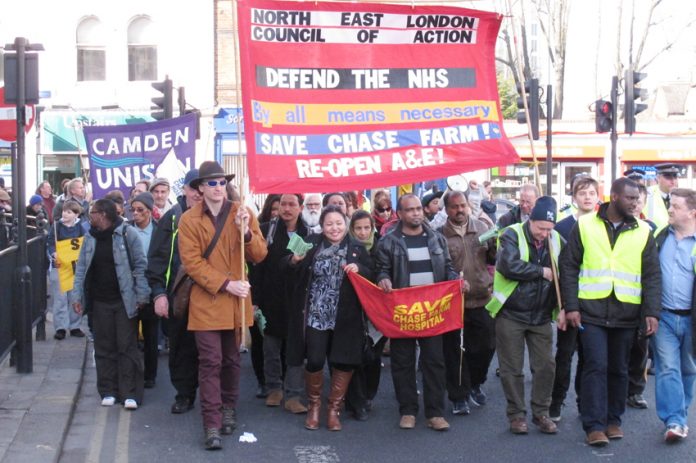ONE year on from the introduction of the Health and Social Care Act, the BMA has launched a new campaign, warning that ‘the damage done to the NHS has been profound and intense’.
With ongoing calls, including those echoed by the BMA, for the Act to be repealed, ‘Health and Social Care Act – is it working?’ aims to highlight the key areas of concern:
• Competitive tendering, creating significant and unnecessary work for commissioners
• The dual role of Monitor to drive integration and competition at the same time
• The role played by the Office of Fair Trading, which is not an appropriate body to make decisions about mergers within the health economy.
Ahead of the campaign the BMA yesterday held a parliamentary seminar with three former Health Secretaries including Andy Burnham MP, Stephen Dorrell MP and Frank Dobson MP chairing the event, as well as former Health Minister Paul Burstow MP, to discuss the impact of the Act so far.
And in the coming months the BMA will be calling on doctors to tell their experiences and what more needs to be done to free them to deliver optimal care to patients.
Commenting, Dr Mark Porter, Chair of BMA Council, said: ‘For a government that campaigned on cutting bureaucracy and red tape, the introduction of the Health and Social Care Act achieved the very opposite. With costs running into the billions it needlessly shook up the fabric of the NHS with very little gain at the end of it.
‘The test for any government health policy should be whether it benefits patients, and while no one wants to see another wholesale reorganisation of the NHS, doctors remain concerned that key aspects of the Act and how they are being implemented could threaten patient safety.
‘Nothing more so than the emphasis on competition over integration and its failure to improve patient care, a concern echoed by Sir David Nicholson, the outgoing head of NHS England already wasted on lawyers as commissioners struggle with the changes.
‘The Office of Fair Trading, whose expertise lies in ensuring consumer choice in private markets, has no place in the NHS. It is in the best interests of patients if decisions on how services are delivered are clinically led, yet the OFT was still able to overturn the proposed merger between hospitals in Bournemouth and Poole despite support from the local community, commissioners and most importantly, clinicians.
‘All of this comes as the NHS continues to be used as a political football despite the government’s assurances that they want to “free NHS staff from political micromanagement”.
‘We have seen doctors openly criticised by Ministers, attempts to force through change such as in Lewisham made for political expediency, and even claims that there are attempts to manipulate NHS England for political purposes.
‘The damage done to the NHS has been profound and intense. Consequently the BMA has taken the concerns expressed by doctors amongst others and calls for the repeal of this act.
‘What we need now is an honest and frank debate over how we can put right what has gone wrong without further top-down reorganisation.’
The country’s leading brain doctors have warned savage cuts are putting cancer patients’ lives at risk. Lead consultant neurosurgeon Matthias Radatz said on April 1st: ‘The changes last year were draconian and patients who wait for radiosurgery have been left totally in limbo. To the layman it’s appalling. To the expert it’s appalling.’
In a damning letter to NHS bosses, he and other experts condemned the planned closure of 18 specialists centres to treat victims of brain cancer. In the letter, 13 of Britain’s top clinicians revealed the problems they are experiencing.
Dr Radatz, the chair of the influential Radiosurgery Clinical Review Group (rcrg), said NHS England was ‘acting out of spite or ignorance’.
The letter, signed by every member of the RCRG representing every region in England, said: ‘There is significant concern about potential risk of harming individual patients due to delayed treatment.’
The letter, penned by Dr Radatz, goes on: ‘We felt this structure was already well-established and in place and there would be no need to re-invent the wheel and that commissioning should continue.’
Meanwhile, the BMA has condemned the health gap between those living in rich and poor areas of Scotland. In a statement to MSPs, BMA Scotland said that ‘health inequalities have remained stubbornly persistent’.
It warned that ‘there are still significant challenges to overcome in reducing the health inequalities gap between the richest and poorest in our society and improving general population health’. The BMA highlighted the importance of employment, education, welfare and housing policies in improving health.
‘An integrated approach to health inequalities is essential for reducing these health differences,’ it said. Dr Andrew Buist, deputy chairman of the BMA’s Scottish GP committee, is due to appear before MSPs with other senior medics. MSPs on Holyrood’s health and sport committee are investigating the issue, taking evidence from doctors.
Public Health Minister Michael Matheson said inequalities could only be lessened by tackling the ‘root causes’. He said: ‘The problem cannot be solved with health solutions alone as health inequalities are caused by entrenched problems of poverty, educational under-attainment, unemployment and poor mental wellbeing.
‘It is our belief that health inequalities in Scotland can only be solved by tackling the root causes of inequality, and taking the fight beyond the NHS. Westminster cuts and welfare reforms have made our task considerably more difficult.’
